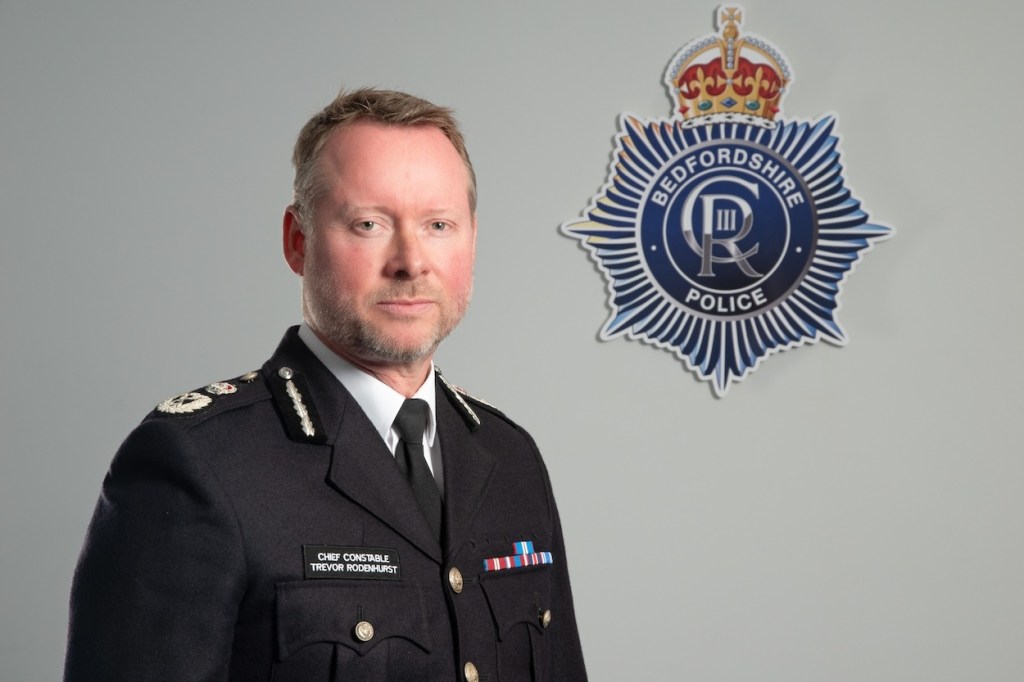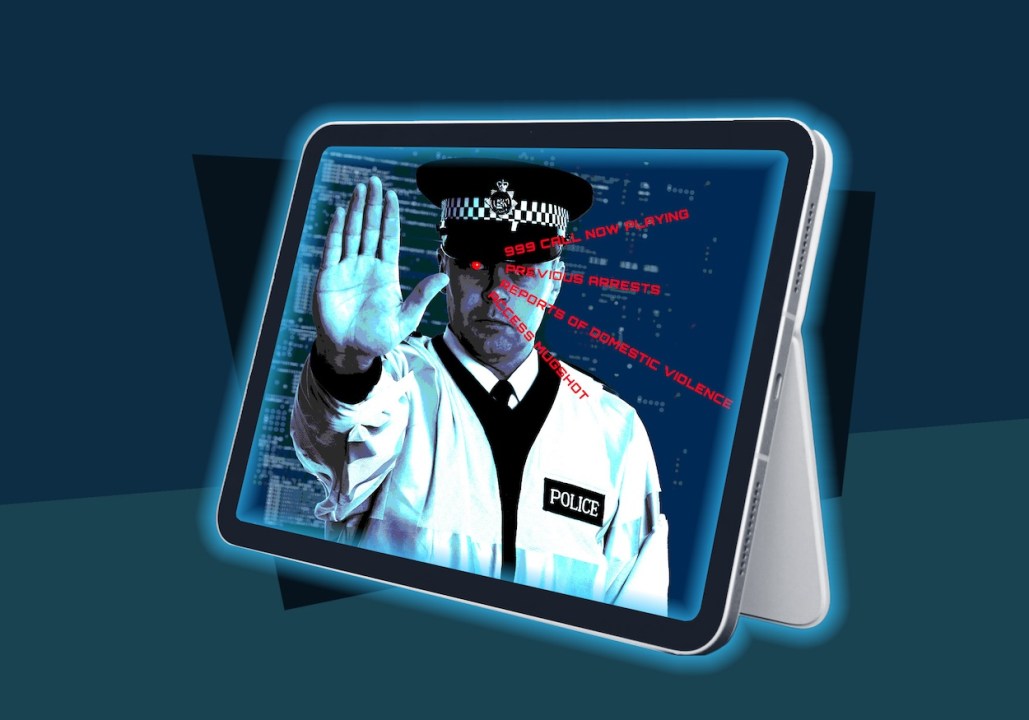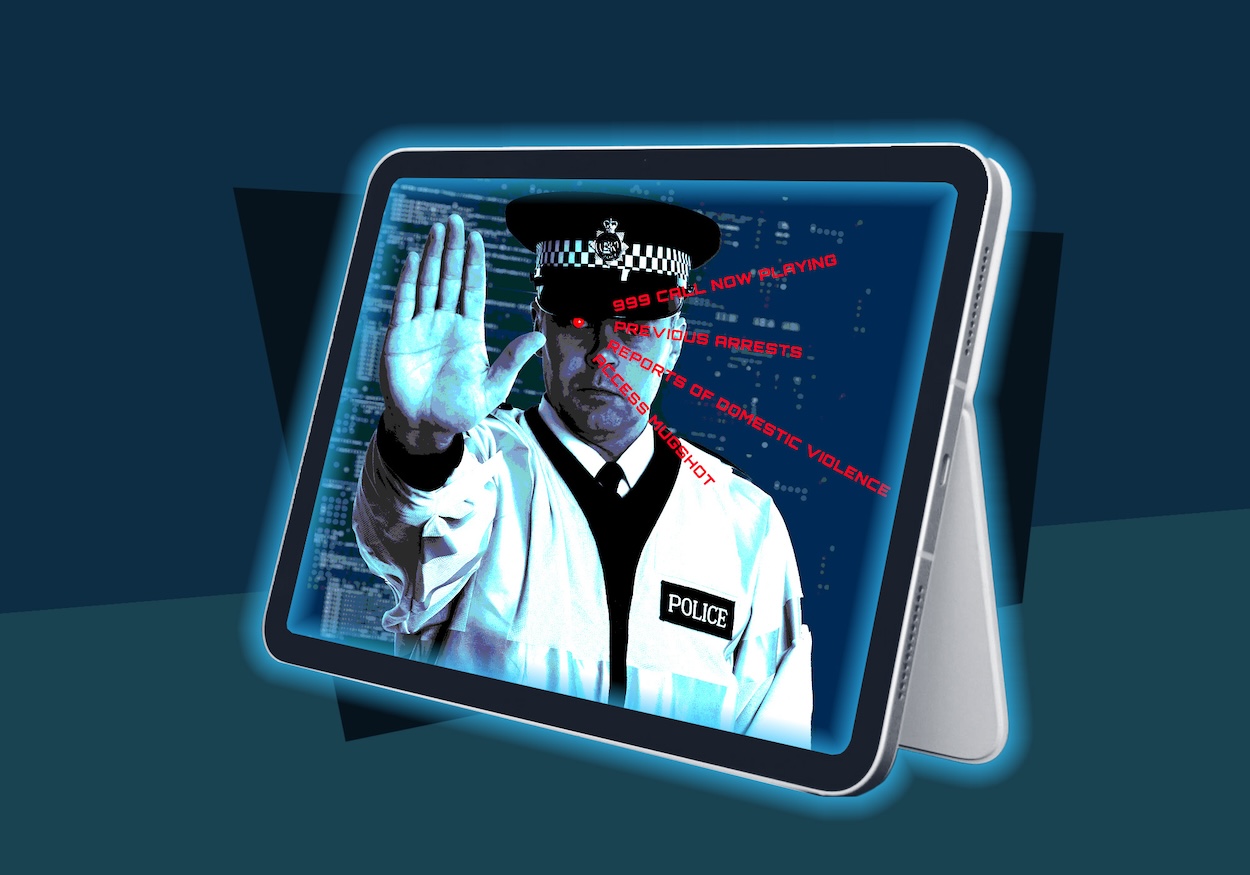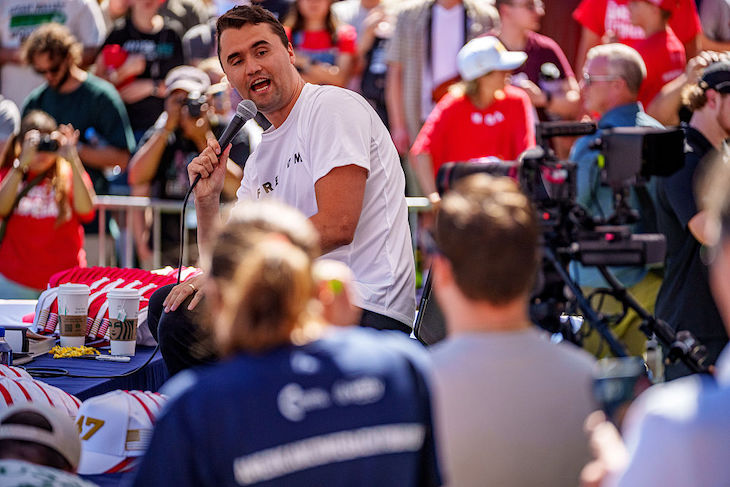‘Small but mighty,’ is how Baroness Casey described Bedfordshire Police when she released her report on grooming gangs over the summer. She told MPs that most forces had failed to properly record child abuse. ‘A bloody disaster, frankly’. But Bedfordshire is different. They’re using artificial intelligence so police can spend more time hunting criminals.
‘I didn’t know about Louise Casey’s comments until you contacted us,’ says Trevor Rodenhurst, the chief constable of the county. That’s unsurprising. Rodenhurst is a busy man. We meet in his office on the outskirts of Bedford, under an official portrait of the King; behind his computer is his ceremonial tipstaff and photographs of his children.
When Rodenhurst took over in 2023, he found that 80 per cent of his officers’ time was spent on admin and paperwork. The remaining one day a week went to proper policing. His job, as he sees it, is to invert that 80/20 ratio and get officers back on the streets. Much of the paperwork was redactions for the Crown Prosecution Service. ‘It’s a requirement under current attorney general guidance,’ he says with a flicker of frustration. Already Rodenhurst has introduced an automated redaction software. Documents that were taking days to process are now being completed in just a few seconds. It sounds dull, but the results are impressive. ‘We calculated that the work hours this saved is the equivalent of about ten people’s time per year, which is huge.’
It is huge, especially for a constabulary that has half the detectives it needs. When the Inspectorate visited two years ago, they found a single officer working on 29 different crimes, 18 of which were rapes. Luton, a centre of child sex abuse, is ‘like a small London borough’. And yet the county has 204 officers per 100,000 residents, below the national average and well below the Met’s 398. The area is a hotspot for county lines drug dealing and has nearly 50 organised crime groups, more than any other in the region. ‘If you look at demand on the service, it’s only increasing. We know that financially, resources can’t match that demand. Leaders like myself have to make choices. We needed to find a way of overcoming our problems.’ Down the hall from Rodenhurst’s office are the men’s toilets. The broken hand dryer is taped off and a note above the sink complains that it’s been blocked by green beans and pasta. Beds HQ isn’t exactly run down, but it’s hardly cutting edge.
Instead of shiny new kit, Rodenhurst is developing digital tools for modern policing, as effective as the handcuffs and truncheons of the 19th century. Already the redaction software has boosted morale for his stretched officers, who joined to catch criminals, not to push paper. But this is just the start. Bedfordshire is transforming into Britain’s first RoboCop constabulary.
At the moment, if someone calls 999, the patrol car sent to help them is equipped with a radio, a satnav and little else. ‘It doesn’t feel that different from when I was doing it, other than the car might be automatic.’ Officers are currently taking calls, typing in postcodes, all while trying to figure out what exactly they’re headed into. It can be frantic. Rodenhurst wants to install iPads that give officers an AI briefing. On screen will be an automatic summary of all the previous records on the address, the audio file of the 999 call and context about the general goings-on in the neighbourhood.
Imagine an officer has been called to a street after reports of an argument. That might not mean much to a new constable hopping into his car. But the chief wants AI to alert squad cars to files that might mention context like domestic abuse. That rookie copper is suddenly primed to notice things he otherwise wouldn’t.
‘At the moment, officers are relying on a control room radio operator to tell them this. But that control room operator might be running the channel for an entire town.’ Giving officers all that information, without having to call someone in HQ, saves time. ‘That might mean that we get there a couple of minutes quicker. This is about making marginal gains in lots of places.’
There’s more they can do with the software. The iPad might tell officers that next door is the last known address of one of the county’s most-wanted criminals. Why not check to see if he’s there? Rodenhurst wants the system to track squad cars, sending in relevant information in real time – there was anti-social behaviour at your location last week, or reports of a convict breaching his bail in the nearby park. Oh, and here’s his on-file mugshot, automatically beamed into the car. I detect an air of satisfaction in Rodenhurst as he tells me about his plans. Building this system, he says, is ‘the challenge we’ve set ourselves for the next 12 months’.

Behind this iPad is something Bedfordshire has already built. Officers are now using an AI that ties together multiple legacy databases – ‘there are dozens and dozens of systems’ – in which information is regularly lost in a web of servers. With this new AI dashboard, officers can simply ask a question and a bot scans every system, giving an answer much like ChatGPT. All the relevant information is pulled up in seconds, regardless of where it’s hiding.
Rodenhurst tells me this has already dramatically improved policing. Under a piece of legislation called Clare’s Law, the police are expected to tell the new partner of a domestic abuser about his criminal history if they think she’s at risk. The problem was that with all those databases it was difficult to know what was going on. Now the dashboard is constantly scanning for information. ‘The moment we switched that on, it immediately alerted us to 70 people we needed to contact.’
There’s a worry that such systems could go haywire, imagining case notes that simply don’t exist. When I asked the police press officer about hallucinations, where AI invents information to satisfy the user, he laughed, unaware that machines did such things. But Rodenhurst tells me that every decision is still made by a human being. The difference is that information appears in front of them, rather than them having to go digging within a Dell computer from 1998. If the officer decides to act, he still needs to review all of those case files and be sure what the system is telling him is true.
It’s all about speed. Those marginal gains that free up time for hitting pavements and crims. Take Bedfordshire’s digital lab trucks, which can scrape phones and laptops for data on site. Before, officers had to package up devices and send them off to digital forensics. For the Met in London, that process takes an average of 267 days to complete. More waiting. More phone calls. More delays. Rodenhurst tells me about a gang his officers recently arrested; they had their phones scraped in one of the vans. ‘Within moments and through terabytes of data, it brought back chat logs – in Romanian, which it translated to English – about the purchase of illegal firearms, drugs, all sorts of criminality. You can imagine the human trawl to do that.’
Everything is about flipping that 80/20 ratio back in the direction of real policing
Everything is about flipping that 80/20 ratio back in the direction of real policing. At a recent gas explosion, six officers were needed to guard the crime scene, 24 hours a day. Bedfordshire is developing drones with thermal imaging that will constantly hover overhead but tethered to the earth so they don’t fly away. ‘Anything moves in, it tells you. Instead of half a dozen officers we’ll have one officer, not standing in the rain but sitting in a car, monitoring the situation.’ That idea came from a staff member. Rodenhurst runs annual Dragon’s Den events where his staff are invited to pitch ideas to speed up their work. ‘The guarantee is, if you win, we’re going to help you bring that idea to life. It won’t be right for every crime scene, but again it’s about those marginal gains.’
He’s been working with Palantir, Peter Theil’s controversial tech firm. The company has been accused of helping Trump’s ICE agents find illegals, developing an IDF algorithm that estimates the presence of terrorists for strikes on Gaza, not to mention its role in building the NHS Covid vaccine app. I raise an eyebrow. ‘This is not about a company, it’s about capability,’ he says. ‘We’ve had vetted engineers sit alongside our operators and crime analysts who say, “Tell me what it is you’re looking for”. They have created this dashboard that enables my staff to answer those questions, but without going into all those different systems.’
I look down at his chunky smart watch and ask whether he’s a techie. He gives me a weary look. ‘What excites me is seeing staff – who we’ve almost asked the impossible of – and transforming their daily experience, so they actually feel that they’re doing the job that they signed up for.’ Much of the subtext of our conversation is about state failure. ‘The thinking in policing for too long has been “what we need is a new system, the system.” And then someone will go and spend a lot of money and multiple years at the Home Office developing it. By the time it’s finished, it’s overrun, it’s overcost, and our staff say, “that’s not what we needed.”’ So Rodenhurst is building these tools himself.
I’m both impressed and aghast. Impressed to find a public servant who is willing to pull up his sleeves rather than begging for ever more cash. Aghast, because this kind of thinking is rare in the public sector. I ask him whether he’s had any interest from national government. ‘I understand there is a team set up at the Home Office looking at these sorts of capabilities for policing.’ That doesn’t sound promising. If I ran the Home Office, I’d permanently deploy my own digital lab truck to the car park, scraping information from this small but mighty office on the outskirts of Bedford.









Comments